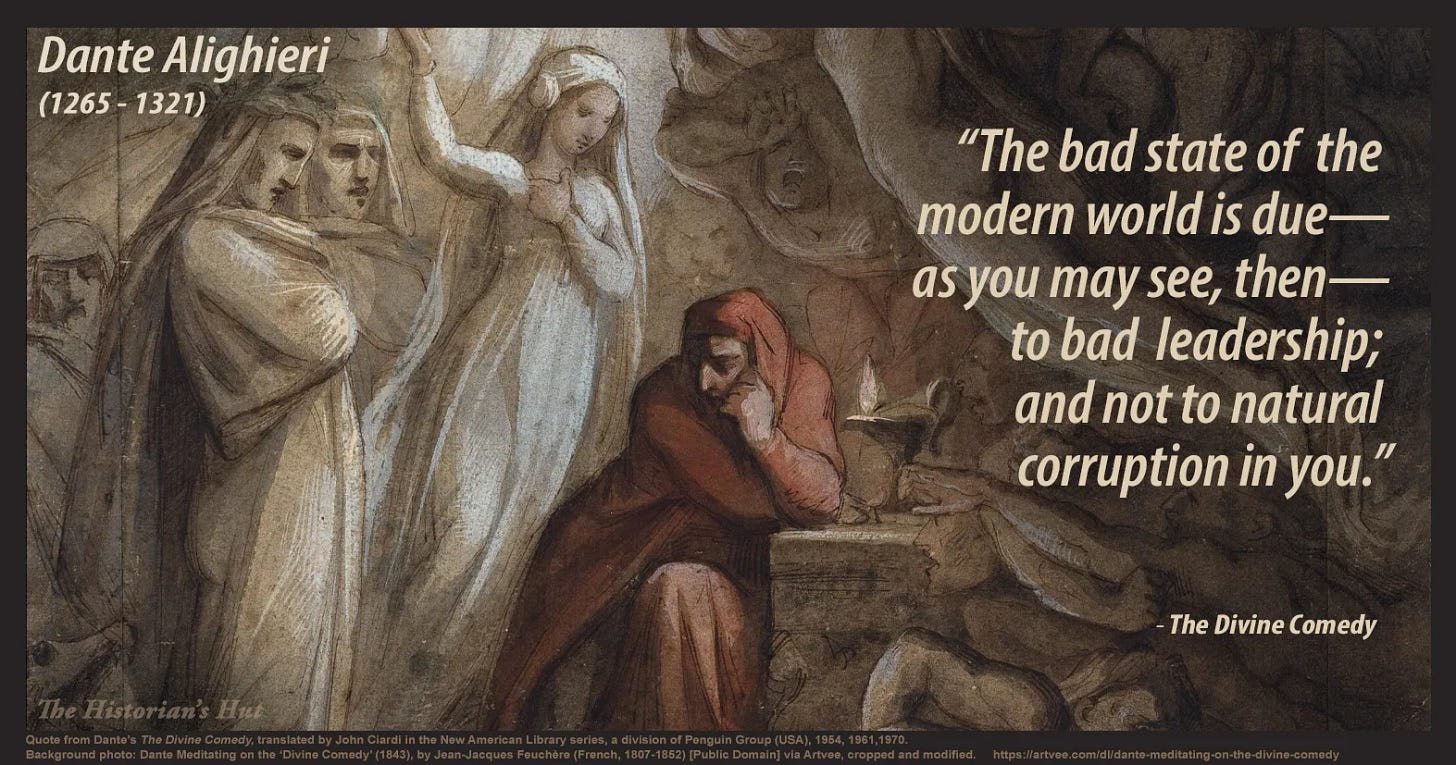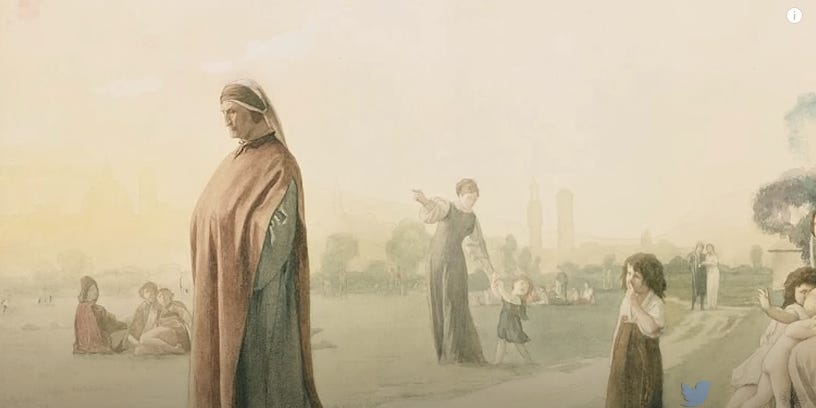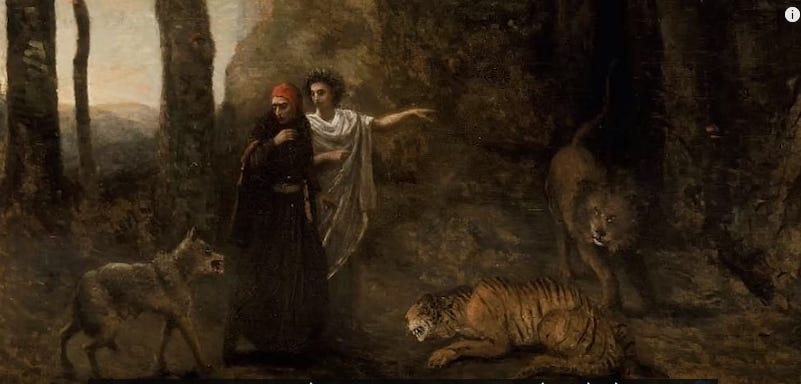What did Dante’s Divine Comedy change in history?
What did Dante’s Divine Comedy change in history?
How are you guys?
Let me tell you that seven hundred and one years ago there lived a poet in the beautiful city of Florence, Italy.
This poet was banished from the city by the papacy, the church
and sentenced him to be burned alive at the stake if he ever re-entered the city.
His crime was that he had fought against too much authority of the Church.
Yes, it was a regular war.
It was the great Italian poet Dante Alighieri from Italy.
In the name of Dante, you must have seen his poetry, read his picture
Actually, friends, this was the time when Europe was ruled by the Dark Ages.
The Holy Roman Empire, based on the geography of Germany and Italy, was crowned by the Catholic Pope.
That is, the Pope used to seal the king's sovereignty. But in comparison
The Pope could not be appointed by the king.
The body of the church itself decided who would be the pope.
The Church was completely independent.
At the same time, he was covered in corruption from head to toe
But what if a large number of people were wholeheartedly with the Church?
So then the church ruled the minds.
But it was not the case that only church supporters were present in public.
A good section of the people also supported the emperor
He was against the undue power and force of the Pope.
So there was fierce war between these two classes.
Sometimes the pope would try to weaken the king by making statements against him
And sometimes the king would plot to remove the Pope. A famous example is the twelfth-century emperor Henry IV
who deposed Pope Gregory VII
That you are not the legitimate Pope, I did not appoint you
In response, Pope Gregory declared the emperor illegitimate and said, "You are not an emperor."
Because we did not crown you
A series of battles ensued between the two and their supporters
Which went on for years.
There were also some wacky, loosely balanced deals. But this problem is not completely solved.
The fight did not stop either
That is why until the twelfth, thirteenth and even fourteenth centuries, the church and court battles continued in different ways.
Sometimes the pope would be victorious and sometimes the emperor would win.
Sometimes in a city the corpses would be laid by the companions of the Pope and sometimes by a commander of the Imperial Power
would have massacred the supporters of the Pope.
The tension between these two pillars of power was so great that the supporters of the pope and the emperor
They used to fight with each other.
Many marriages even broke up over whether you sided with the king or the church.
Brother would quarrel with brother and friends would come to the neck of friends
There were fights over who should rule on God's earth.
of the King or of the Pope, the guardian of God's house.
So in the fourteenth century, a similar battle was going on in Florence, Italy.
Among the two groups fighting in it, one was the White Gwyphs
Who was in favor of reducing papacy, i.e. the authority of the Pope
He was in favor of giving more freedom to the cities.
But in comparison, there were black wyves
who wanted to give more power to the Pope.
Now our poet Dante was on the side of the White Guiffes, that is, he did not want the strict grip of the Pope on his city of Florence.
At the beginning of these wars of the late thirteenth century
Dante's party, the White Goofs, won and lost.
The Black Gwyphs overpowered the Whites and defeated them.
This is where Dante's downfall began, before he was so popular his name was enough money.
It was the reign of Roman Pope Boniface.
Dante was accused of corruption by the church and heavily fined.
Dante did not have the fine money now.
All of it was lost in the Battle of Florence.
Because of which he was ordered to leave the city
He was told to re-enter the city only with the fine money, or he would be burned alive.
So this was the case
Dante left his beloved city of Florence forever
He left the city but the love of his city and his love in that city
They never left him.
Nor could the hatred of the enemy ever leave his heart.
In thirteen hundred and one, "Thirteen O One", he had to leave Florence and never returned
.In 1321, he also died in the city of Ravenna in Italy.
It was during these twenty years that he wrote his masterpiece Divine Comedy.
This poem was a very strong reaction of a common man to the clergy and the powerful people of Europe, but hatred.
I will tell you his story right now in this vlog and show you the numerous paintings that have been made on him.
But know for now that it was during his exile that Dante came to hate the elites of Europe so much
That he wrote this poem for the first time out of tradition
He wrote in the street language of the common people instead of Latin, the favored language of the Romans
Because Latin was only the language of the elite elite class.
It could only be read by priests and bishops etc
The common people had no understanding of it.
They could not read it, so the effect of this poem was written in everyday language
That same language became the language of today's Italy.
Latin gradually disappeared from their culture.
That is why Dante is called the father of the language spoken in Italy today.
Dante's Divine Comedy was the first masterpiece of the modern Italian language
This poem proved to be so popular and influential that it freed Europe from the clutches of the clergy
played an important role.
If you've seen our Martin Luther vlog, you'll know
From selling priests tickets to heaven to telling about rebellion against the church
We have also made a slight mention of Dante's efforts.
So this video is the description of it.
So this intro was very important
To explain why the Divine Comedy and Dante are still great today?
We also tell and show you a short summary of this poem
Which we have shorted very hard. Because it's actually that long
That in old times used to cover many thousands of pages.
There were thousands of pages, a big paper was printed on it.
But the good edition that is available today on Amazon is also nine hundred and twenty-eight pages long.
Well, this timeless poem of Dosto Dante consists of three parts.
The first part is Inferno
The second is "purgatorio" meaning "purgatory" and the third is paradiso meaning heaven, paradise.The story of the first part of Inferno is that Dante gets lost in a dark forest.
In this forest he meets Virgil
who was a very famous poet of Rome even before the time of Julius Caesar two thousand years ago.
From here on, Virgil becomes Dante's guide
And takes him on a tour of hell and paradise
.First they both enter hell which has nine parts or nine circles
Both poets reach the bank of a river for their journey to hell and here they meet
Derived from a character from the Greek Deumala
.
This character is "Sharon" who was reputed to be visited by the spirits of the dead
And Sharon takes them in his boat across the river into the underworld, into the underworld.
That is, it brings them to the place where they have always been.
So now when Dante and Virgil come to Sharon, he also takes them across the river in his boat.
As was famous in mythology.
From here the two poets enter the first part of Hell, "Limbo".Interestingly, in this part of hell, quite the opposite of popular belief
No specific punishment is being given to any person.
This is because it housed those people
Those who had done good deeds but were not baptized according to the Christian fait
That is, was not baptized.
For this reason, they were now in Hell, but in the least tormented part of it.
Their only punishment was to be constantly worried, moaning.
So they were filling up
.In the other part of Hell, the circle consisted of those who had forgotten religion for the sake of physical pleasure.
These people were constantly being dragged around by the stormy winds.
It was a sign that these people had left their bodies free for sins
However, stormy winds are now free to blow them around
.In the third and fourth part, greedy and wasteful people were being punished in various ways.
One of these punishments was that the hell-bound were sunk in a swamp
And hail was raining down on them while a three-headed dog was eating them
.Thus, in the fifth part of hell, those who spread anger and despair were being punished.
The sixth part of hell was in a city that no one was allowed to enter.
Virgil and Dante somehow get into the city.
Here they see those who insulted religion lying in their graves
And the fire was burning in their graves
What was bothering them.
These people were in great pain.
On this occasion, Dante asks Virgil various questions about Hell
And Virgil keeps answering hi
From here, when these two enter the seventh part of Hell, they find such people in this place
Those who had been violent, assaulted or killed in life.
Especially those who used to quarrel with their neighbors.
Apart from this, the people who committed suicide were also kept in the same part of Hell, i.e. the seventh part
Here Dante and Virgil also see rivers of blood.
In the seventh part of the Inferno, Dante and Virgil meet another character from the Greek mythology, Gray Wool.
The head of this character is humanoid but the rest of the body is animal, resembling a snake or a scorpion.
Dante and Virgil ride this beast into the eighth part of Hell
.Here he sees the impostors and duplicitous people being punished in ten different categories.
One of these punishments was that the faces of sinners were turned upside down.
That is, the body was straight but their face was turned towards the back of the body
Now they could not see ahead so they were always forced to walk backwards.In the eighth part of Hell he also sees his enemy "Pope Boniface Eight" and his predecessor, Pope Nicholas III.
They are thrown upside down into a fire burning in holes in the ground.
Fire is coming out of their feet
Throughout the poem, Dante rubs the church powerfully
He has given various punishments to them in his poem
.
Well, after examining the eighth gate of Hell, Dante hears the sound of a trumpet.
Well, after examining the eighth gate of Hell, Dante hears the sound of a trumpet.
He travels in the direction of this sound and reaches the ninth and last part of hell.
Within the ninth section of hell were four more circles.
Traitors were being punished within these circles.
Interestingly, people were not being burned in this section
Instead, they were forced to freeze in the snow.
In this part of Hell, Dante and Virgil met in the famous legend Lucy Fur, the ruler of Hell
.Dante and Virgil then come out of Hell
And reach an open place where they can see the stars in the sky
At this point, the story of Inferno ends
And the story of Purgatory begin
Purgatory is the place where such people are sent according to Christian belief
Who asked for forgiveness for their sins before dying
We also mentioned Purgatory in this vlog about Europe.
In it you saw how the Catholic Church was selling tickets to Heaven in the name of Purgatory.
Then, for the same reason, the Protestant movement was started by Martin Luther.
So Virgil and Dante also go to the same Purgatory in the Divine Comedy.
Here they meet sinners who are being cleansed of their sins through lesser punishments
So that they can enter heaven.
Just as there were nine parts of hell, the hill of Purgatory was also divided into nine circles.
In the lower two circles lived those who could not seek forgiveness for their sins in time
Or those who were excommunicated by the Church from the Christian community
It was too late for the sins of these people to be forgiven.
But above these two circles, which were the seven circles, the people who were there had a higher chance of going to heaven.
Among these seven realms, the lowest realm was made for proud people.
While the seventh and last circle was for humans suffering from sensual desires.
Just above this last circle, at the top of Purgatory, was Heaven, from where, according to the Bible
Adam and Eve, Adam and Eve, were cast out.
Dante goes through the nine parts of Purgatory and moves towards Heaven.
But Virgil, who is his companion, since he is not a Christian, is a pre-Christian man
So he cannot enter heaven.
Virgil leaves Dante at the gates of Heaven and prepares to go back to nearby
Someone approaches him rustling.
This is a girl Dante already knows
.
Dante is delighted.
This girl is actually "Beatrias" from his beloved city of Florence
.And he fell in love with her.
But could not get it because Beatrias was married to someone else
And then the irony is that the girl died at a young age.
So now in Dante's imagination he was standing at the gates of heaven and his first love was welcoming him.
Seeing Beatrias at the gates of heaven, he has the same condition
Which happened at the age of nine, seeing Hasan Bayil in front of him.Beyond this, Beatrias becomes Dante's guide and takes him on a tour of Paradise
.Here begins the third and final part of the Divine Comedy
This third part is called Paradiso or Paradise.
Here Dante observes the sky and describes its different parts.
He explains that the sky is also in the form of nine spheres.
That is, just as there were nine, nine parts or circles in hell and purgatory, similarly there are nine circles in heaven
.
The lowest sphere of these is the Moon and the highest and last sphere is the "prime mobile".
Where angels live according to Dante.
Above this circle is the place which Dante named Emperion
And he claims that this place is the house of God.
When Dante and Beatrias reach Emperion, Beatrias's beauty is greater than ever.
Here Dante's existence is also bathed in light
And he becomes able to meet God
.Beatrias then leaves Dante and goes inside a giant rose.
This flower is the home of spirits and angels fly around it.
Dante then has a vision of God according to Christian belief.
God appears before him in the form of three spheres of light.
These three circles represent the three parts of God, the Father, the Son and the Holy Spirit, according to the Christian Blues.
Here, Dante also gets a glimpse of Christ.
Dante's soul is then absorbed in the all-pervading love of God.
So friends, this is a brief introduction to Dante's poem The Divine Comedy.
It is common to mention the corruption of the Church in the Divine Comedy, but there are so many other aspects, so much data in it.
There is so much content that it is impossible to describe it in one video, you must read it yourself once in your life.
Due to its very qualities, this poem is considered one of the masterpieces of literary history.
Thousands of Pentagons have been built on it and countless books have been written.
This poem has given Dante such fame that today people do PhDs on his life and poetry.People from all over the world come to Ravenna, Italy to see his grave.
Famous novelist Dan Brown, who has written great novels like The Da Vinci Code and Angels and Demons, which were also made into films.
He has also written a great novel "Inferno" with The Divine Comedy in the background.
Meaning, the fascination of Dante's Divine Comedy has not ended even today
Finally, friends, this question must be churning in your curious mind
Why did Dante call this poem the Divine Comedy?
Because there is no aspect of 'comedy' in the entire poem.
This is a very serious, rather frightening poem.
So the answer is that when Dante wrote this poem, seven hundred years ago today
Seven centuries ago
So comedy at that time did not mean just humor.
Rather, any writing that begins with a tragedy was called a comedy
But the end should be happy and hopeful, that is, a happy ending.
In this sense, The Divine Comedy begins with the tragedy of hell
And then it ends with a visit to heaven and a meeting with God
That is, in the end, everyone starts to laugh and live happily.
That is why this poem is called The Divine Comedy.
By the way, Dante only named this poem as 'La Commedia' or 'The Comedy'.
The word 'divine' was later added by the priests
And yes, one last and very interesting thing
that Dante was punished by the Church at the beginning of the "fourteenth centur18:2
In other words, he was banished from the city on charges of corruption, that punishment has now been abolished.
In 2008, the City Council of Florence, Italy dropped all corruption charges against Dante
And canceled his sentence.
That is, if he wants to come to the city now, he can come
Dante was given a clean chit seven hundred and one years after his death
.He also gave the biggest award of the city.So, sir, you took an imaginary tour of hell and heaven in The Divine Comedy, but do you know?
That an imaginary paradise was also created by animals
It is called enamel form. SO, PLEAS WAIT OUR NEXT POST FOR ANIMAL FARM AND SUPPORT ME….KASHIF’S SUBSTACK

























